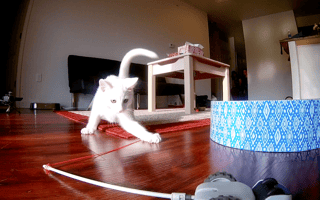
Getting actionable user feedback is a challenge for every early-stage startup. That challenge is compounded when your core users are independent-minded, curmudgeonly and known for expressing strong opinions by violently lashing out.
We are talking, of course, about cats.
Different cats like different things, but there are some things most cats have in common. For Petronics, a startup that makes robot-mouse friends for cats to play with, researching those common threads has been a project years in the making.
We’re trying to build self-driving cars that fit in your hand.”
“If there’s one certainty about cats, it’s that hiding things really attracts them,” said co-founder Dave Cohen. “Most cats, most of the time, will look kind of bored when they can see our robot. But as soon as they can’t, they’ll instantly go after it,”
That attraction ties back to how their ancestors survived in the wild.
“If cats can see their prey, they also hypothesize that the prey can see them,” said co-founder Michael Friedman. “As soon as you break that line of sight, they have methods of sneaking up on them. They’re stalkers.”
As any Roomba owner knows, home environments are basically obstacle courses for robots to get stuck in. But the small form factor of Petronics’ robot, Mousr, is only slightly larger than that of an actual mouse — making it even easier for the robot to get trapped. Friedman said the robot uses a range of movement strategies, as well as a motorized tail, to get unstuck.
When operating autonomously, the Mousr switches automatically between two modes: one for attracting a cat’s attention and one for escaping cats already on the chase. Loaded with sensors, the robot can switch between one or the other based on how cats are engaging with it. The Mousr can also be steered remotely through an accompanying smartphone app.
The founders will rely on that smartphone connectivity to collect data on how cats are engaging with the robot and push firmware upgrades to introduce new behaviors and escape tactics.
The bulk of Petronics’ hardware development went into making the robot small and light enough to not harm cats, walls, furniture or human feet while cruising through a living room at 12 miles per hour. The Mousr weighs in at 60 grams — roughly the weight of a tennis ball — but it’s still durable enough to crash into walls without taking damage.
Friedman, an engineer by training and a cat parent of four, oversees Petronics’ hardware development operation, while Cohen works on its accompanying mobile app. Co-founder David Jun, a Chicago native, focuses on the software powering the robotic mouse’s behavior.
The trio founded Petronics while they were in graduate school for electrical engineering at the University of Illinois at Urbana-Champaign. The startup raised nearly $117,000 for its Mousr in a 2014 Kickstarter campaign, and has since raised more than $2.5 million in outside funding.
The company has also received backing from the National Science Foundation to research additional uses for its lightweight autonomous robotics technology. As it turns out, making a robotic cat toy requires more cutting-edge tech than first meets the eye.
“The biggest technical challenge for us is doing everything we do at a small size and at a low cost,” said Jun. “Building a $20,000 robot that doesn’t do much yet won’t gain much traction.”
Added Friedman: “We’re trying to build self-driving cars that fit in your hand.”
Potential uses for Petronics’ technology include small personal assistants that can travel throughout a home, assisting the owner with tasks like security patrols and checking in on elderly family members and children. Making personal assistants small, mobile and affordable, Friedman said, will unlock new opportunities to bring convenience to more households without getting in the way.
Having worked on the robot since 2014, the founders say the robot breaks new ground with its use of sensors, flexible plastics and custom components, making it difficult for competitors to catch up if they’re starting from scratch.
“We work with the same factory as iRobot, which makes the Roomba, but even with a factory with that much experience, we’re doing a lot of stuff they’ve never done before,” said Friedman.
The field of home robotics is still in its early days, which can make finding engineering talent a challenge. Friedman said the company’s early recruiting relied heavily on the founder trio’s networks at UIUC, but that the startup is now turning its eyes toward Chicago.
The founders said they are considering opening a second office in Chicago as they grow their team from 10 to 15 in the upcoming year.




